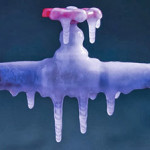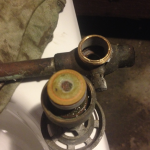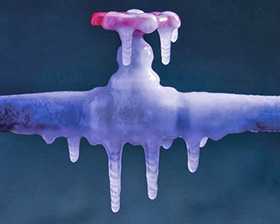 Very cold temperatures will cause pipes to freeze and burst when they thaw out. You can avoid the headache of dealing with frozen plumbing if you take some very simple precautions. Dealing with frozen pipes can be a very big inconvenience. Frozen water pipes can cause a temporary loss of these plumbing fixtures:
Very cold temperatures will cause pipes to freeze and burst when they thaw out. You can avoid the headache of dealing with frozen plumbing if you take some very simple precautions. Dealing with frozen pipes can be a very big inconvenience. Frozen water pipes can cause a temporary loss of these plumbing fixtures:
- Toilet, kitchen
- Kitchen sink
- Lavatory
- Laundry tub
- Water Heater
- Heat
Depending on how long pipes stay frozen, a home or apartment building can become uninhabitable by a temporary loss of any necessary plumbing fixtures required to make it habitable. Could you imagine not being able to use the toilet or even taking a hot shower before going to work wouldn’t that be very upsetting!
Pipes can freeze from several ways:
- Forgetting to shut the water off to outside spigots or unheated areas
- From water that is not drained out of hose spigots and pipes
- From the cold air that blows in somehow through uninsulated cracks in walls.
Pipes that can freeze are:
- Hot and cold water pipes
- Heating pipes from boilers
- Sewer and drain pipes
Besides several ways
Outdoor water pipes and spigots using an older shut- off valve can also freeze if the valve has a worn out washer. The water that would slowly seep through inside the valve would cause the pipe to re-fill with water and freeze during winter.
Not just water pipes that freeze…
Clogged drains and sewers also can freeze from being located in unheated areas if not unclogged quickly! A drain or sewer pipe that becomes clogged in a very cold crawl space will freeze from the standing water that’s inside it eventually cracking the pipe.
It’s supposed to be a very cold winter this year in Pittsburgh. Take a look at the farmer’s almanac CBS Pittsburgh.
What should you do?
Before autumn sets in visually inspect your pipes and shut – off valves in your basement that connect to your outdoor hose spigots. A hose spigot is a valve that you hook your garden hose to either outside of your home or in your garage. If you notice that you have older shut – off valves, you should have them replaced. The time to inspect and replace shut off valves would be (early autumn).
Follow these tips to prevent freezing of your pipes:
- Insulate exposed water, drain, and heating pipes
- Install heat tape around exposed pipes
- Seal off any open cracks in walls and crawl spaces
- Make sure shut – off valves for outdoor hose connections shut off completely
- Insulate walls and ceilings where drafts can enter
- Let the faucets drip on very cold days
- Leave outdoor hose spigots open once they are shut off and drained for the winter
Don’t let your pipes freeze!
Don’t wait until it’s too late and your pipes burst. Click here to have a proper cold weather pipe inspection.


